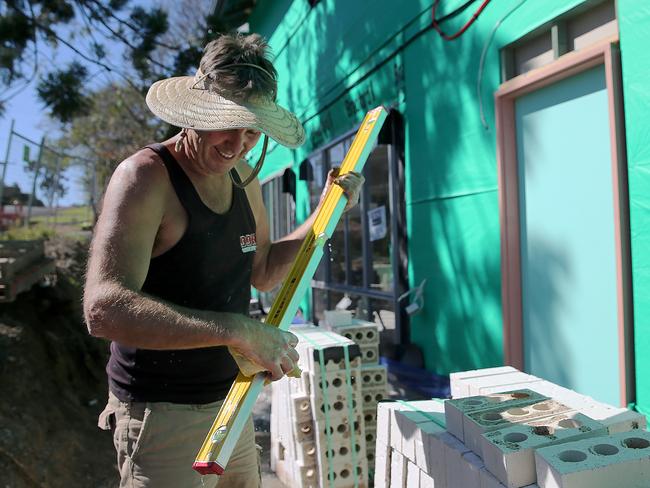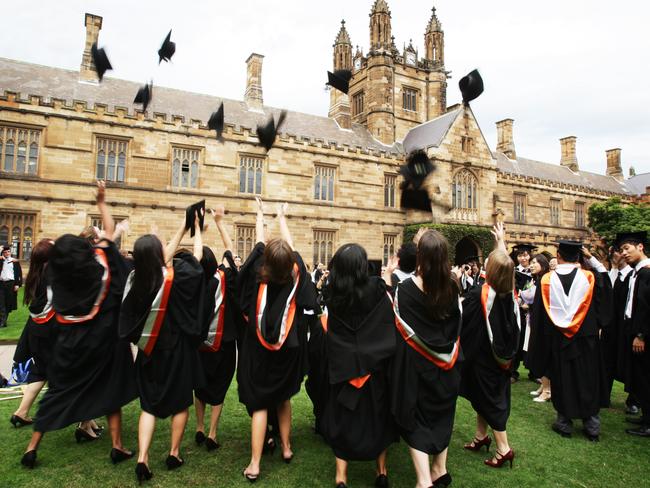Easier access to university has devalued degrees, created huge debt and made some feel like failures
FROM the barista with a law degree to the aspiring engineer bartender, unis churn out more graduates with “broken dreams”.
AUSTRALIA’S university system is letting students down and pumping out graduates with “broken dreams and a large student debt”, the head of a body representing the country’s most prestigious institutions has noted.
Group of Eight chief executive Vicki Thomson has highlighted the broken state of the system in a wideranging speech she delivered today at the Graduate Employability and Industry Partnerships Forum.
She said the removal of caps on student numbers and the introduction of a “demand driven” system, had led to unintended consequences.
Universities were now pumping out an oversupply of graduates, making it hard for some to get jobs despite spending significant time and money on their education.
Ms Thomson also noted that the value of vocational study had also been eroded, with people forced to consider going to university “or be labelled a failure”.
Almost 40 per cent of Australians aged 25 to 34 years old now had an undergraduate degree, an achievement helped by the world’s most generous income-contingent student loan scheme (HELP).
But Ms Thomson said reaching this goal had not led to the “career utopia” many graduates dreamt of, and had come at enormous financial cost to the country.
“Personally we all know the barista or bartender, with an honours in law,” Ms Thomson said.
“The young guy serving in Officeworks who is a mining engineer; the young woman in the bakery with two degrees in the marketing space. None of us are happy with those outcomes.”

Not only was this a big expense to students, but the economy was also paying.
Student debt from HELP will be almost $200 billion in 2024-25, something which universities know is unsustainable.
It comes as the government tries to find ways of raising money to cover this increasing burden. Prime Minister Malcolm Turnbull is looking at allowing universities to set their own fees for some “flagship courses”, as an alternative to the unpopular proposal put forward by ex-PM Tony Abbott that all university fees be deregulated. Universities could also see their government funding cut by 20 per cent.
The idea released in an options paper with the Budget suggested allowing universities to set their own fees for courses in which up to 20 per cent of their students were enrolled.
But the Group of Eight (representing Sydney University, Melbourne University and others) and the Australian Technology Network of Universities (representing RMIT, the University of Technology, Sydney and others) have criticised the idea.
The network said there could be an “inequitable drift” of those who could afford to pay to attend certain “prestige” courses at particular institutions, making similar courses at other universities seem less attractive.
Student debt is already a growing problem, especially as degrees no longer guaranteed jobs.
This could potentially saddle the government with writing off bad debts if students could not afford to pay their loans back.
Encouraging more students into the university system had also led to businesses no longer valuing bachelor degrees because they had become a base level of achievement in many areas.
“More graduates feel they have to keep studying, to seek out a masters — and with it more student debt — to give them a career edge — or even parity in some cases,” she said.
Ms Thomson said there was an “uncomfortable trend” of employers asking job seekers for university qualifications even if they are applying for non-professional jobs that previously would have required a TAFE certificate or less.
“Over past months my staff have pointed various examples out to me, including advertising for a recruitment team co-ordinator, an admin co-ordinator and a PA in a property development firm who had to have completed a bachelor with a major in property,” she said.
“Each of these noted that a degree qualification was a must.”
She said asking people to get university degrees for jobs that didn’t need them risked diminishing the value of university education.
“University isn’t for everyone. It was never intended for everyone,” she said.
“Equally there should never have come a point where entering a ‘trade’ was seen as a lesser path way.
“This nation is built, literally, on its trades and its TAFE diplomas. Enormous economic value. Irreplaceable in the past, present and the future.
“We should be encouraging vocational study, not allowing it to be seen as a consolation prize.”
She said under the demand-driven system, those studying degrees had increased but those doing other qualifications had languished.
“I doubt it was ever intended that the demand driven system would set up society to consider the lack of a degree as a failure,” she said.
“But that is what has been occurring. There is anecdotal evidence of family aspirations leading to students being channelled away from TAFE and a trade into a degree program.”
She said more opportunities should be opened up for students who did not want to complete degrees.

GRADUATES NO LONGER GUARANTEED JOBS
Ms Thomson said universities shouldn’t just be degree factories that aimed to teach narrow skills.
This was more important than ever as degrees no longer guaranteed jobs and someone graduating today would likely have 17 jobs across five careers in their lifetime.
She said teaching was one example of a career that was pumping out way more graduates than could realistically get jobs.
Quoting an article in The Australian from the University of Melbourne Vice Chancellor Glyn Davis, Ms Thomson noted there were 80,000 students studying teaching but only 7000 full time jobs on offer each year.
In another example, Ms Thomson said other graduates may begin a degree with good career prospects at the time, but the job market could be very different by the time they finished a four-year degree.
Ms Thomson used the mining boom as an example.
In 2007, 100 per cent of mining engineering graduates who wanted fulltime work were employed but by 2013, this had dropped to 83 per cent.
The numbers are even starker for geology students.
In just two years (from 2012 to 2014), those working fulltime fell from 84 per cent to just 57 per cent.
“Universities must play a vital role in making a graduate more generally employable, and knowledgeable,” she said.
She said students needed to be taught portable skills such as research, teamwork, analytical thinking, problem solving, communication and project management.
“And it is a fallacy to assume that such generalist degrees do not lead to good employment outcomes,” she said.

Ms Thomson pointed to a US study that showed liberal arts majors with an advanced or undergraduate degree were making more money on average than those who studied in professional or pre-professional fields by their mid-50s. They were also employed at similar rates.
She said the key was finding a balance between graduates who do end up working in specific careers, and those who don’t.
“Both are essential, as I say — the key is finding the balance.”
While many graduates did not end up working in the field they studied for, universities played a role in giving students the confidence to venture into self-employment, and/or diverse employment.
“The cost to the nation of their degree has not been wasted, nor has the cost to themselves,” she said.
“We have provided them with a strong foundation to contribute to the economy — as they are doing — and will increasingly need to be able to do, if they are to be successful in a career that will increasingly be marked by technological breakthroughs and disruption.”
Ms Thomson said universities were often criticised for not turning out work ready graduates but said there should also be discussion about whether businesses were asking more of today’s graduates.
She said part of the problem may be that businesses could no longer afford to give graduates the time to adjust to their roles, or to give them old-fashioned on-the-job mentoring.
“Which leads me to repeat — that universities have a far broader role in society, and for our students, than being a degree factory for jobs.”
charis.chang@news.com.au



